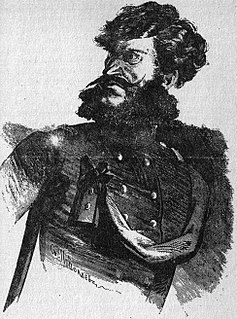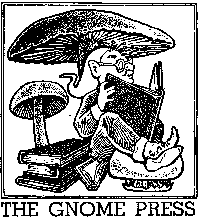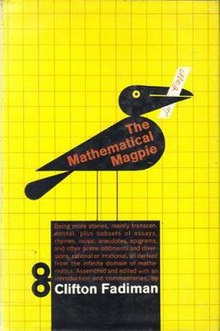British science fiction writer Arthur C. Clarke formulated three adages that are known as Clarke's three laws, of which the third law is the best known and most widely cited. They are part of his ideas in his extensive writings about the future.

In its original sense, a shaggy dog story or yarn is an extremely long-winded anecdote characterized by extensive narration of typically irrelevant incidents and terminated by an anticlimax.
Midwestcon is a science fiction convention held annually in the Cincinnati, Ohio area by the Cincinnati Fantasy Group.

Clifton Paul "Kip" Fadiman was an American intellectual, author, editor, radio and television personality. He began his work with the radio, and switched to television later in his career.

Dying Inside is a science fiction novel by American writer Robert Silverberg. It was nominated for the Nebula Award in 1972, and both the Hugo and Locus Awards in 1973.

Gnome Press was an American small-press publishing company primarily known for publishing many science fiction classics. Gnome was one of the most eminent of the fan publishers of SF, producing 86 titles in its lifespan — many considered classic works of SF and Fantasy today. Gnome was important in the transitional period between Genre SF as a magazine phenomenon and its arrival in mass-market book publishing, but proved too underfunded to make the leap from fan-based publishing to the professional level. The company existed for just over a decade, ultimately failing due to inability to compete with major publishers who also started to publish science fiction. In its heyday, Gnome published many of the major SF authors, and in some cases, as with Robert E. Howard's Conan series and Isaac Asimov's Foundation series, was responsible for the manner in which their stories were collected into book form.

The Idler was an illustrated monthly magazine published in Great Britain from 1892 to 1911. It was founded by the author Robert Barr, who brought in the humorist Jerome K. Jerome as co-editor, and its contributors included many of the leading writers and illustrators of the time.

The World Treasury of Science Fiction (ISBN 0-316-34941-0) is a science fiction anthology edited by David G. Hartwell, published by Little, Brown and Company in 1989.
Richard Decker a cartoonist and illustrator, studied at the Pennsylvania Museum School of Industrial Art and became famous for his cartoons published in The New Yorker.
The Jeffery–Williams Prize is a mathematics award presented annually by the Canadian Mathematical Society. The award is presented to individuals in recognition of outstanding contributions to mathematical research. The first award was presented in 1968. The prize was named in honor of the mathematicians Ralph Lent Jeffery and Lloyd Williams.

Isaac Asimov Presents The Great SF Stories 9 (1947) is a science fiction anthology edited by Isaac Asimov and Martin H. Greenberg. It is the ninth volume of Isaac Asimov Presents The Great SF Stories, a series of short story collections, which attempts to list the great science fiction stories from the Golden Age of Science Fiction. They date the Golden Age as beginning in 1939 and lasting until 1963. The book was later reprinted as the first half of Isaac Asimov Presents The Golden Years of Science Fiction, Fifth Series with the second half being Isaac Asimov Presents The Great SF Stories 10 (1948). This volume was originally published by DAW books in February 1983.

Isaac Asimov Presents The Great SF Stories 11 (1949) is the eleventh volume of Isaac Asimov Presents The Great SF Stories, which is a series of short story collections, edited by Isaac Asimov and Martin H. Greenberg, which attempts to list the great science fiction stories from the Golden Age of Science Fiction. They date the Golden Age as beginning in 1939 and lasting until 1963. The book was later reprinted as the first half of Isaac Asimov Presents The Golden Years of Science Fiction, Sixth Series with the second half being Isaac Asimov Presents The Great SF Stories 12 (1950). This volume was originally published by DAW books in March 1984.

Fantasia Mathematica is an anthology published in 1958 containing stories, humor, poems, etc., all on mathematical topics, compiled by Clifton Fadiman. A companion volume was published as The Mathematical Magpie (1962). The volume contains writing by authors including Robert Heinlein, Aldous Huxley, H. G. Wells, and Martin Gardner.

The Science Fictional Olympics is an anthology of science fiction short stories edited by Isaac Asimov, Martin H. Greenberg, and Charles G. Waugh as the second volume in their Isaac Asimov's Wonderful Worlds of Science Fiction series. It was first published in paperback by Signet/New American Library in June 1984. It has been translated into Italian in the series Urania.

Omnibus of Science Fiction is an anthology of science fiction short stories edited by Groff Conklin. It was first published in hardcover by Crown Publishers in 1952, and reprinted in 1953; a book club edition was issued by the same publisher with the Science Fiction Book Club in the same year. Later editions were issued by Bonanza Books/Crown Publishers in 1984 and Chatham River Press in 1984. An abridged paperback version including eleven of its forty-three stories was published by Berkley Books in August 1956 under the variant title Science Fiction Omnibus and reprinted in November 1963. A two volume British edition, also abridged, was published in hardcover by Grayson & Grayson in 1953-1954 under the variant titles Strange Travels in Science Fiction and Strange Adventures in Science Fiction; together, they included twenty-two of the original forty-three stories.

Fifty Short Science Fiction Tales is an anthology of science fiction short stories and poems edited by Isaac Asimov and Groff Conklin. It was first published in paperback by Collier Books in 1963 and reprinted in 1966, 1968, 1969, 1971, 1973, 1974, 1976, and 1978; a later reprint was issued by Scribner Paperback Fiction in August 1997. The book has been translated into Italian.

Comets is an anthology of science fiction short stories edited by Isaac Asimov, Martin H. Greenberg and Charles G. Waugh as the fourth volume in their Isaac Asimov's Wonderful Worlds of Science Fiction series. It was first published in paperback by Signet/New American Library in February 1986.

Space Mail, Volume II is an anthology of science fiction short works edited by Isaac Asimov, Martin H. Greenberg, Charles G. Waugh. It was first published in paperback by Fawcett Crest in January 1982.














